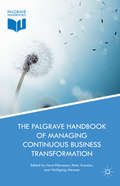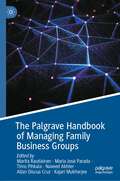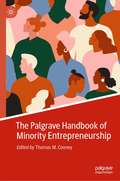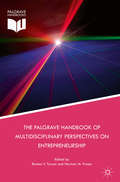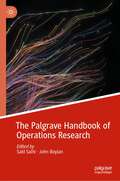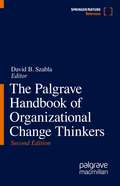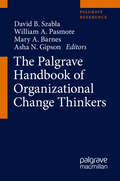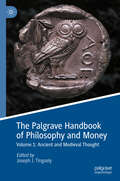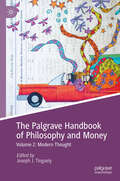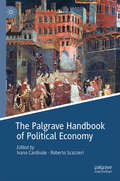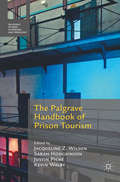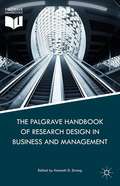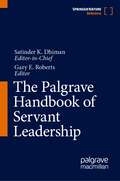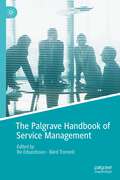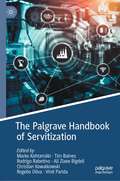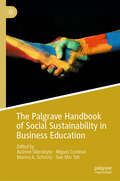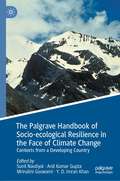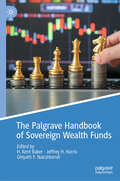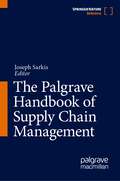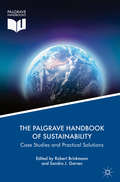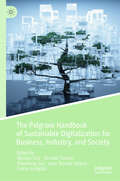- Table View
- List View
The Palgrave Handbook of Managing Continuous Business Transformation
by Horst Ellermann Peter Kreutter Wolfgang MessnerThis handbook provides a comprehensive and unparalleled reference point for studying continuous business transformation. Asserting that change will be the new normal and highlighting the fact that business transformation can never be complete, this important resource is a tool for coping with ongoing change in order to become and stay resilient, the predominant concern of executives across industries. Containing case study material to illustrate issues and solutions, The Palgrave Handbook of Managing Continuous Business Transformation takes an interdisciplinary approach weaving together strategic concepts with real-life experiences, connecting human resource issues with shifts in information technology and linking customers with the businesses from which they buy. Structured into four parts; transformational shifts, achieving customer centricity, dealing with new technology and leading the change, this handbook is crucial reading for academics, scholars and practitioners of business transformation.
The Palgrave Handbook of Managing Family Business Groups
by Marita Rautiainen Timo Pihkala Maria José Parada Allan Discua Cruz Naveed Akhter Kajari MukherjeeFamily business groups (FBGs) are ubiquitous, influential, and play a major role in national economies. While much of the current research around this topic has so far focused on emerging economies, more knowledge is needed on family business groups in developed economies; specifically, how they innovate, strategize, govern, and grow. Offering a comprehensive and global perspective on family business groups, this Handbook comprises international contributions from leading experts. Split into five sections, it covers strategy and business transformation; innovation strategies; management and governance; and new avenues for research on FBGs including the issues of sustainability and cultural alignment. An important resource for students and researchers of family business, strategy and management, this Handbook signals the emergence of the family business group phenomenon and solidifies research in this evolving area of study.
The Palgrave Handbook of Managing Fossil Fuels and Energy Transitions
by Geoffrey Wood Keith BakerThis Handbook is the first volume to comprehensively analyse and problem-solve how to manage the decline of fossil fuels as the world tackles climate change and shifts towards a low-carbon energy transition. The overall findings are straight-forward and unsurprising: although fossil fuels have powered the industrialisation of many nations and improved the lives of hundreds of millions of people, another century dominated by fossil fuels would be disastrous. Fossil fuels and associated greenhouse gas emissions must be reduced to a level that avoids rising temperatures and rising risks in support of a just and sustainable energy transition. Divided into four sections and 25 contributions from global leading experts, the chapters span a wide range of energy technologies and sources including fossil fuels, carbon mitigation options, renewables, low carbon energy, energy storage, electric vehicles and energy sectors (electricity, heat and transport). They cover varied legal jurisdictions and multiple governance approaches encompassing multi- and inter-disciplinary technological, environmental, social, economic, political, legal and policy perspectives with timely case studies from Africa, Asia, Australia, Europe, North America, South America and the Pacific. Providing an insightful contribution to the literature and a much-needed synthesis of the field as a whole, this book will have great appeal to decision makers, practitioners, students and scholars in the field of energy transition studies seeking a comprehensive understanding of the opportunities and challenges in managing the decline of fossil fuels.
The Palgrave Handbook of Minority Entrepreneurship
by Thomas M. CooneyBringing much needed clarity and definition to the term 'minority entrepreneur,' this authoritative and timely handbook explores the distinctive challenges that minority communities face when founding and managing new ventures. The handbook is inclusive of any community who might be considered disadvantaged or under-represented in terms of entrepreneurial activity and included are women, youths, seniors, disabled, immigrants, Indigenous peoples, LBGTQ+, ex-offenders, Roma, refugees and many others. Chapters highlight the idiosyncratic nature of the many communities examined before offering frameworks and models that draw together the various findings. With a cast of international contributors, this scholarly handbook discusses the surrounding literature of minority entrepreneurship and takes an all-encompassing approach to its interpretation. It also addresses the sorely under-researched area of entrepreneurial behaviour among minorities and disadvantaged groups. This is particularly important for policymakers tasked with designing and delivering initiatives that are appropriate for the needs of these communities. Ultimately this handbook contributes to existing knowledge by:• providing a current understanding of the literature for each of the communities;• investigating the uniqueness of the entrepreneurial behaviour within the communities; • offering new frameworks/models from which future researchers can build new knowledge.The handbook provides a comprehensive account of an important and fast emerging field of entrepreneurship, and is an invaluable resource for students, researchers and policymakers.
The Palgrave Handbook of Multidisciplinary Perspectives on Entrepreneurship
by Romeo V. Turcan Norman M. FraserDeparting from the traditional approach of surveying current and future trends and developments, this unique Handbook brings phenomena, theories, and concepts from multiple disciplines together to advance entrepreneurship. With original contributions from authors who are experts in their fields, the collection offers state-of-the-art insights into generating new areas for research, new theories and concepts, and new questions for policy debates – all aimed at advancing entrepreneurship. Divided into four sections and covering perspectives such as neuroscience, theology, organisational behavior and education, The Palgrave Handbook of Multidisciplinary Perspectives on Entrepreneurship is a rich source of information for researchers, educators, entrepreneurs, leaders and managers.
The Palgrave Handbook of Natural Gas and Global Energy Transitions
by Damilola S. Olawuyi Eduardo G. PereiraThe Palgrave Handbook of Natural Gas and Global Energy Transitions provides an in-depth and authoritative examination of the transformative implications of the ongoing global energy transitions for natural gas markets across the world.With case studies from Africa, Asia, Europe, North America, Latin America, South America, Australia, and the Middle East, the volume introduces readers to the latest legal, policy, technological, and fiscal innovations in natural gas markets in response to ongoing global energy transitions. It outlines the risk mitigation strategies and contractual techniques — focusing on resilience planning, low-carbon business models, green procurement, climate-smart infrastructure development, accountability, gender justice, and other sustainability safeguards — that are required to maximize the full value of natural gas as a catalyst for a just and equitable energy transition and for energy security across the world.Written in an accessible style, this book outlines the guiding principles for a responsible and low-carbon approach to the design, financing, and implementation of natural gas development and commercialization. It is an indispensable text and reference work for students, scholars, practitioners, and stakeholders in natural gas, energy, infrastructure, and environmental investments and projects.
The Palgrave Handbook of Occupational Stress
by Philippe Fauquet-Alekhine James ErskineThis handbook brings together an international group of experts to offer a comprehensive resource on occupational stress. Including both theoretical and practical perspectives, it examines ways to reduce and treat stress, as well as the physiological, psychosocial, and neural underpinnings of it. Through 24 original and carefully selected essays, the authors offer new insights, resources, and tools to better understand, manage and treat stress in a professional environment.The book’s chapters are divided into 5 parts that address the conceptualisation of stress; present theoretical models (including the contribution of animal models); examine the psychological and physiological aspects of stress and ways to assess it; delve into psychosocial risks at work and their assessment (means and methods); and investigate how to cope with stress at work, including resilience training. Aspects such as the effects of leadership, simulation training, and stress-tests for hiring are also presented and discussed. The volume ends by exploring broader considerations regarding stress and culture, stress and occupational sectors (with a chapter focusing on studentship), and the pharmacology of stress. This handbook is an essential reference for researchers in organisational psychology, as well as business and management and education, who are interested in stress. Healthcare workers and therapists who treat stress will also find an invaluable resource in this far-reaching yet accessible collection.
The Palgrave Handbook of Operations Research
by Saïd Salhi John BoylanOperations Research (OR) is a fast-evolving field, which is having a significant impact on its neighbouring disciplines of Business Analytics and Data Science, and on contemporary business and management practices. This handbook provides a comprehensive and cutting edge collection of studies in the area. Views differ on what should be included within the scope of OR. The editors of this volume have taken the view that an inclusive stance is the most helpful, both for theory and practice. Real-world problems often require consideration from both ‘softer’ and ‘harder’ perspectives and need consideration of both predictive and prescriptive problems. In accordance with this inclusive approach to OR, the book is divided into six parts, covering Discrete Optimization, Continuous Optimization, Heuristic Search Optimization, Forecasting, Simulation and Prediction, Problem Structuring and Behavioural OR, and finally some recent OR Applications.This wide-ranging handbook includes a culturally diverse collection of authors, with different perspectives and backgrounds around Operations Research. It will be of tremendous value to researchers, students and practitioners in the field of OR
The Palgrave Handbook of Organizational Change Thinkers
by David B. SzablaThe key developments and advancements in organizational change over the last century are the result of the research, theories, and practices of seminal scholars in the field. While most books simply outline a theorist’s model, this handbook provides invaluable insight into the contexts and motivations behind their contributions. Organized alphabetically, this handbook presents inspiring and thought-provoking profiles of prominent organizational change thinkers, capturing the professional background of each and highlighting their key insights, contributions, and legacy within the field of organizational change. This updated edition add 29 profiles to the 87 original profiles. By bringing these scholars’ experiences to life, we can begin to understand the process of organizational change and analyze what remains to be done for organizations today. This book is the first of its kind - the go-to source for learning about the research and practice of organizational change from those who invented, built, and advanced the field. This comprehensive handbook will help researchers and students to develop their organizational change research agendas, and provide practitioners with concepts, theories, and models that can easily be applied to the workplace to lead change more effectively.
The Palgrave Handbook of Organizational Change Thinkers
by David B. Szabla William A. Pasmore Mary A. Barnes Asha N. GipsonThe key developments and advancements in organizational change over the last century are the result of the research, theories, and practices of seminal scholars in the field. While most books simply outline a theorist's model, this handbook provides invaluable insight into the contexts and motivations behind their contributions. Organized alphabetically, this handbook presents inspiring and thought-provoking profiles of prominent organizational change thinkers, capturing the professional background of each and highlighting their key insights, contributions, and legacy within the field of organizational change. By bringing these scholars' experiences to life, we can begin to understand the process of organizational change and analyze what remains to be done for organizations today. This book is the first of its kind--the go-to source for learning about the research and practice of organizational change from those who invented, built, and advanced the field. This comprehensive handbook will help researchers and students to develop their organizational change research agendas, and provide practitioners with concepts, theories, and models that can easily be applied to the workplace to lead change more effectively.
The Palgrave Handbook of Philosophy and Money: Volume 1: Ancient and Medieval Thought
by Joseph J. TinguelyThe Palgrave Handbook of Philosophy and Money surveys the role of money in the history of ideas. Volume 1: Ancient and Medieval Thought explores the worldviews of societies in the process of monetization. The volume is divided into sections on early Civilizations, classical Greece, the Roman era, and Medieval and Renaissance thought.
The Palgrave Handbook of Philosophy and Money: Volume 2: Modern Thought
by Joseph J. TinguelyThe Palgrave Handbook of Philosophy surveys the role of money in the history of ideas. Volume 2: Modern Thought examines the treatment of money in the writings of philosophers from the emergence of capitalism through the 20th century. The volume is divided into sections on Early Modernity, Late Modernity, and the Twentieth Century. Volume 2 presents an alternative history of modern philosophy in which monetary relations are both an explicit theme and an implicit condition of philosophical reflection.
The Palgrave Handbook of Political Economy
by Ivano Cardinale Roberto ScazzieriThis book is a major contribution to the study of political economy. With chapters ranging from the origins of political economy to its most exciting research fields, this handbook provides a reassessment of political economy as it stands today, whilst boldly gesturing to where it might head in the future. This handbook transcends the received dichotomy between political economy as an application of rational choice theory or as the study of the causes of societies’ material welfare, outlining a broader field of study that encompasses those traditions. This book will be essential reading for academics, researchers, students, and anyone looking for a comprehensive reassessment of political economy.
The Palgrave Handbook of Prison Tourism
by Kevin Walby Justin Piché Sarah Hodgkinson Jacqueline Z. WilsonThis extensive Handbook addresses a range of contemporary issues related to Prison Tourism across the world. It is divided into seven sections: Ethics, Human Rights and Penal Spectatorship; Carceral Retasking, Curation and Commodification of Punishment; Meanings of Prison Life and Representations of Punishment in Tourism Sites; Death and Torture in Prison Museums; Colonialism, Relics of Empire and Prison Museums; Tourism and Operational Prisons; and Visitor Consumption and Experiences of Prison Tourism. The Handbook explores global debates within the field of Prison Tourism inquiry; spanning a diverse range of topics from political imprisonment and persecution in Taiwan to interpretive programming in Alcatraz, and the representation of incarcerated Indigenous peoples to prison graffiti. This Handbook is the first to present a thorough examination of Prison Tourism that is truly global in scope. With contributions from both well-renowned scholars and up-and-coming researchers in the field, from a wide variety of disciplines, the Handbook comprises an international collection at the cutting edge of Prison Tourism studies. Students and teachers from disciplines ranging from Criminology to Cultural Studies will find the text invaluable as the definitive work in the field of Prison Tourism.
The Palgrave Handbook of Research Design in Business and Management
by Kenneth D. StrangThe Palgrave Handbook of Research Design in Business and Managemen t uses a new state-of-the-art research design typology model to guide researchers in creating the blueprints for their experiments. By focusing on theory and cutting-edge empirical best-practices, this handbook utilizes visual techniques to appease all learning styles.
The Palgrave Handbook of Servant Leadership
by Satinder K. DhimanThis reference work offers comprehensive perspectives on servant leadership. Featuring a cadre of leading world-class scholars, practitioners, and contributing authors from diverse fields of inquiry, it aims to collate research on servant leadership with a particular focus on its moral and spiritual dimensions.It is divided into sections that center on topics such as character, philosophical influences, diversity and inclusion, critiques of servant leadership as well as examples of servant leadersThough first introduced in the 1970 by Robert Greenleaf, the field of servant leadership is still lacking consensus on a definition and a theoretical framework. The goal of this reference work is to begin to fill this gap by assembling the scholarship of the top scholars in this field and providing a go-to source for information on the theory and practice of servant leadership. This handbook will serve as an essential resource for researchers, scholars, and students of organizational behavior, human resource management, and business ethics, as well as consultants and business leaders interested in discovering the best leadership models to suit contemporary organizations.
The Palgrave Handbook of Service Management
by Bård Tronvoll Bo EdvardssonThis handbook provides an innovative, thorough overview of service management. It draws together an impressive, international group of leading scholars who offer a truly global perspective, exploring current literature and laying out guidance for future research. Beginning with defining service as a perspective on value creation, and service management as “a set of organizational competencies for enabling and realizing value creation through service,” it then moves on to follow the evolution of service research. From there, the book is structured into six main themes: perspectives on service management; service strategy; service leadership and transition; service design and innovation; service interaction; quality and operations; and service management and technology. This book is valuable reading for academics, lecturers, and students studying service management, operations management, and service research.
The Palgrave Handbook of Servitization
by Marko Kohtamäki Tim Baines Rodrigo Rabetino Ali Ziaee Bigdeli Christian Kowalkowski Rogelio Oliva Vinit ParidaManufacturers have shifted their focus from products to smart solutions in search of higher returns and additional growth opportunities. This shift, described as servitization, or lately as a digital servitization, is not a simple process. Academic study has revealed that its issues are complex, problematic, contingent, and even paradoxical, involving multiple organizational layers, such as operations, strategic, relational, and even ecosystemic layers. Recent literature studies have called for improved theories in servitization, and even alternative narratives. In this handbook, the chapters take different perspectives towards servitization, digital servitization or Product-Service-Software systems, presenting and debating over concepts such as organizational transformation, change management, strategic management, business models, innovation and product-service operations. The handbook provides an opportunity to develop improved theoretical grounds for servitization, and thus to elaborate and develop the field further. This volume will be of great interest for the servitization community, including scholars, Ph.D. and master students, but also company managers, developers and consultants facilitating company’s servitization efforts.
The Palgrave Handbook of Social Sustainability in Business Education
by Soo Min Toh Aušrinė Šilenskytė Miguel Cordova Marina A. SchmitzThis book provides a holistic conceptualization of social sustainability, going beyond the topics of diversity, equity, and inclusion, and showcases how the United Nations’ Sustainable Development Goals (SDGs) emphasizing social sustainability can be integrated into business studies’ curricula in different parts of the world. A unique collection of literature comprising educational principles, content, activities, and cases will guide educators, managers of business study programs, and higher education leaders in developing engaging, high-impact educational experiences that enable students to solve grand societal challenges and grow as ethical, inclusive leaders. This handbook features a wide-range of tested teaching innovations. These cover education models addressing newest trends, such as utilizing artificial intelligence and blockchain technologies in education about-and-for socially sustainable business or skill development for enabling circular economy and sustainable production and consumption patterns. The classical, impactful yet underutilized in business studies instructional techniques such as storytelling and theatre are also discussed comprehensively. The cross-disciplinary approach of the handbook speaks to scholars aiming to research and implement business education, which connects social, environmental, and economic dimensions in quality education that promotes sustainable development.
The Palgrave Handbook of Socio-ecological Resilience in the Face of Climate Change: Contexts from a Developing Country
by Sunil Nautiyal Anil Kumar Gupta Mrinalini Goswami Y. D. Imran KhanThis book shares experiences and knowledge on climate change impacts and adaptation, risk reduction strategies, communities’ responses, and best practices from different landscapes of India. It provides insights into climate change risk reduction in trans-disciplinary frameworks. The findings and discussions put forward in the chapters, largely based on micro-level case studies, provide an in-depth understanding of interactions among ecology, society, and economy under different conditions of changing climate. It contains critical discussion on both existing and required actions as adjustments to climate change impacts by different actors at diverse scales and contexts. The recommendations will be beneficial in climate change adaptation planning for India and other developing countries, where a large portion of the population directly depends on climate-sensitive sectors. The content of the book is interdisciplinary and it will be beneficial for scholars and practitioners from natural science, social science, policy, and governance across the continents.
The Palgrave Handbook of Sovereign Wealth Funds
by H. Kent Baker Jeffrey H. Harris Ghiyath F. NakshbendiThe Palgrave Handbook of Sovereign Wealth Funds provides a comprehensive, detailed analysis of these funds from a multidimensional perspective consisting of 33 chapters divided into seven sections. Section I provides background material about SWFs, providing a foundation for the remainder of the handbook. Section II examines various controversies, governance, and accountability topics involving SWFs. Section III discusses the political, legal, and tax aspects of SWFs. Section IV reviews numerous topics involving SWF management. Section V deals with SWFs’ policies, preferences, and performance. Section VI provides descriptive analyses of SWFs based on country or region. It also offers a comparison of SWF similarities and differences across countries. Section VII concludes by examining special issues and the future of SWFs.This handbook spans the gamut from theoretical to practical while offering the right balance of detailed and user-friendly coverage. Discussion of relevant research permeates the handbook. Although other books are available on SWFs, few are as comprehensive or provide a multidimensional perspective from academics and practitioners. This handbook fills a gap by showing how SWFs are a growing and dynamic force in international finance.
The Palgrave Handbook of Supply Chain Management
by Joseph SarkisThis handbook offers a comprehensive presentation of the field of supply chain management. Divided into six sections, it addresses broad strategic issues, then focuses in on specific locations and technology issues along the supply chain. The chapters explore topics related to upstream supply chain management, organizational operations and management of supply chains, downstream supply chain management, transportation and logistics management, with strategic, technology, economic, and operational dimensions also covered. Further, the book includes cross-cutting concerns relating to issues such as sustainability, performance management, financial concerns, resilience, and inventory management. Each chapter presents background on the topics, examines the current concerns of interest to practitioners and researchers, identifies future directions of research, and addresses the managerial implications related to the topic With chapters written in an accessible, easy-to-grasp style, this work will serve as a go-to reference for academics, students, and practitioners alike.
The Palgrave Handbook of Sustainability: Case Studies And Practical Solutions
by Robert Brinkmann Sandra J. GarrenThis book provides a comprehensive overview of the practice of sustainability through a diverse range of case studies spanning across varied fields and areas of expertise. It provides a clear indication as to the contemporary state of sustainability in a time faced by issues such as global climate change, challenges of environmental justice, economic globalization and environmental contamination. The Palgrave Handbook of Sustainability explores three broad themes: Environmental Sustainability, Social Sustainability and Economic Sustainability. The authors critically explore these themes and provide insight into their linkages with one another to demonstrate the substantial efforts currently underway to address the sustainability of our planet. This handbook is an important contribution to the best practises on sustainability, drawn from many different examples across the fields of engineering, geology, anthropology, sociology, biology, chemistry and religion.
The Palgrave Handbook of Sustainability in Fashion
by Claudia E. Henninger Panayiota Alevizou Daniella Ryding Helen GoworekThe impact of the fashion industry on the environment is undoubtedly size-able. In response, the last decade has seen various changes in the fashion industry landscape, from new digital technologies that enhance zero waste productions, the emergence of the digital platform economy, to the development of innovative materials. This Handbook captures key innovations within the fashion industry and brings together work from leading academics, but also practitioners in the field. Offering a comprehensive and global perspective, it covers core topics such as: technological innovations and their impact on sustainable fashion, alternative models of consumption, the circular economy, the role of activism and the future of sustainable fashion. With clear managerial implications, chapters uniquely supplement conceptual work with short practitioner-led case studies that bridge the gap between theory and practice, making this a valuable resource for students and researchers.
The Palgrave Handbook of Sustainable Digitalization for Business, Industry, and Society
by Myriam Ertz Urvashi Tandon Shouheng Sun Joan Torrent-Sellens Emine SarigöllüThis handbook conceptualizes sustainable digitalization and discusses the role of digitalization in addressing business and societal challenges. Divided into eight sections, the book opens by an introductory chapter examining the theoretical foundations of the field. Part 1 explores the first dimension of sustainable digitalization, namely digitalization for sustainability (DFS) or how digitalization could address several of the sustainable development goals. Part 2 addresses the second dimension of sustainable digitalization. Titled responsible digital (RD), it covers the potential risks of increased digitalization and outlines strategies for governing digitalization for sustainable development to avoid the risks summarized earlier in the book. Tying digitalization to such topics as smart agriculture, industry 4.0, education, ecological transition, climate, clean water, food production, and social well-being, this handbook provides a framework for the emerging field of sustainable digitalization.
